
Monday, December 17, 2007
Monday, November 26, 2007
An Interview with Pankaj Mishra
Mishra continues to be one of the most thoughtful literary and journalistic voices in contemporary India. I enjoyed reading a detailed interview with him in "The Believer" magazine. (Thanks to Amitava Kumar's blog).
Excerpts:
"--- but I think the reporter or journalist is well served by having a responsibility to the powerless, to use a much-abused cliché. The voice of the powerless is in some danger of not being heard in the elite discourses we now have in the mainstream media. This is something that I’ve learned late. Obviously, I write for a very elite audience, but is there something else that I’m also responsible to? People who write about issues like poverty or terrorism are a part of the elite, and the distance between the elite and nonelite is growing very fast. You can move around the world but meet only people who speak your language, who share the same ideas, the same beliefs, and in doing so you can lose sight of the fact that the vast majority of the world does not think or believe in or speak the everyday discourse of the elite. Yet their lives are being shaped by these elites, by people like us. I don’t mean this in a pompous way, but we have a responsibility to articulate their sense of suffering."
"--- some of my students seem to want to be able to write without actually reading, which seems utterly bizarre. When I assign certain readings, they often say, “I can’t relate to this,” which means whatever story we’re reading is so far outside of their experience—which tends to be limited—that they will not make the effort to understand what it is about. I find this a crippling attitude to have toward literature, toward history, toward all sorts of things.
Some of my students don’t have a sense of whether their writing is any good or not. They think it’s good just because it comes out of them and it’s a part of their being. To criticize their writing is to criticize them in some profound way. It’s as if they’ve been taught far too much self-confidence—and maybe not much else."
Sunday, November 25, 2007
The New Pakistani Middle Class - New York Times
Some excerpts:
As he fights to hold on to power, General Musharraf finds himself opposed by the expanded middle class that is among his greatest achievements, and using his emergency powers to rein in another major advance he set in motion, a vibrant, independent news media.
Since he took power, Pakistan’s gross domestic product has doubled. The number of cellphones has soared to 50 million, from 600,000 six years ago. The privatization of banks has led to a huge increase in the sales of cars, motorcycles and, perhaps most important, television sets. Globalization has taken hold, as it has in other countries.
That spreading economic success — and exposure to the outside world — has filled Pakistan’s white collar office workers, stockbrokers and small-business operators with a belief that their country can be more than the backward fief of a few generals, many said in interviews.
--------------------------------------------------------------------------------
For decades, Pakistan’s moderate elite has been dismissed as “the chattering classes,” who have shied away from the political arena and rarely voted.
Instead the political system has been dominated by feudal landlords who could deliver huge blocks of votes from poor tenant farmers. The key to winning elections was striking the right alliances and spreading graft, not developing a coherent political platform or putting in place broadly beneficial social policies.
Yet the country is slowly changing, in ways that have left a growing number arguing that Pakistan is more prepared than ever for democratic rule.
---------------------------------------------------------------------------------
This spring, the middle class vigorously supported a successful campaign by the country’s lawyers to reverse an attempt by General Musharraf to dismiss the country’s chief justice.
For now, greater mobilization is hobbled by a deep distrust of their political leaders and the United States. A perception is growing that the United States will betray middle-class Pakistanis — Washington’s greatest long-term ally in the fight against terrorism — and continue backing an unpopular military ruler who refuses to give up power.
Many said they believed that General Musharraf had tried to contain — but not eliminate — a dangerous rise in militancy in the country because it allowed him to garner billions in American military aid for Pakistan’s army.
Friday, November 23, 2007
The Myth of Musharraf's "Sincerity"
I finally responded to a friend on why this view is wrong-headed and an incorrect framing of the issues. I have decided to share that response more widely given its potential relevance to a broader group(purging any personal details and after minor editing).
___________________________________________________________
An Open e-mail:
The question of "sincerity" is wholly irrelevant to any discussion of Pakistan's political crisis. I have no idea whether Musharraf, Nawaz, Benazir, Imran or anyone else is sincere or genuinely cares about a better Pakistan. I can claim no special insight for looking into people's hearts to divine their 'true' intentions. The only things that I am able to base my judgments on are observable actions and outcomes geared towards the goals that I embrace. If the actions further these goals then I am supportive of those actions, if not I oppose them. If on balance individual leaders do more to advance these goals than to retard them compared with other political actors then they have my support.
Based on my view above, the fundamental question therefore is this: What are the goals and principles that we support and how is any individual leader measuring up in helping achieve these goals? The goals we should support include first and foremost, the strengthening of civilian state institutions and clear progress toward a rule of law based constitutional democracy ( i.e. an independent judiciary, right of people to elect and throw out their governments via a constitutional process, civilian supremacy over the armed forces and intelligence agencies), growth oriented economic policies with sustained social investments in basic education and health and a free and independent media.
How do I judge Musharraf on performing to these goals? A C- before November 3rd and an F after the second Martial Law. Since November 3rd, Musharraf has showed complete willingness to destroy every last vestige of independent Pakistani institutions for perpetuation of personal power, backed by the barrel of the gun. Even actions he was given credit for prior to November 3rd, such as support of a free media, have seen a complete reversal now when the media has refused to play his tune. Macroeconomic growth (without much trickle down, however) is the only silver lining of his 8 year autocracy but it has come at the price of institutional destruction, deep internal political instability, alarming rise in extremism and persistent US interference in all facets of Pakistan's governance to the point where the US Ambassador is a virtual Viceroy meeting government officials, political leaders, election commission officials and media organizations in trying to rescue a "failed state with nukes".
Musharraf equates his own personal interest with the national interest. National interest cannot be determined by an individual or the military. It can only be arrived at with the people's consent and with institutional checks and balances on the behavior of all political actors, including the military. He has been solely incharge for 8 years as a COAS and President with a rubber stamp parliament since 2002 but what greater measure of his failure to build any stable institutional structure that he still had to decapitate his own system by overthrowing the independent judiciary, shutting down the electronic media and locking up most of moderate civil society all while falsely claiming to have done this in the name of fighting terrorism. Are we supposed to take his word that he is sincere after his rigging a referendum, rigging 2002 elections, breaking promises to take his uniform off twice, letting the most corrupt politicians and feudals off the hook as long as they joined PMLQ or were willing to support him (BB recently, MQM since the beginning) and now unleashing despotic and illegal acts since November 3rd? How is this persistent pattern of tyrannical actions and political corruption consistent with the advance of institutions and a "true democracy"? After eight years of misrule, should we continue to wait for General Musharraf indefinitely to prove his sincerity despite accumulated piles of evidence to the contrary.
As part of Pakistan's educated class, I urge you to support principled positions rooted in institutions not individual saviors however well meaning. Choose long term goals over short termism and don't be easily seduced by facile arguments in favor of the rotten status quo in the name of pragmatism. Join the forces and build the capabilities of the developing Pakistani civil society that will provide a more robust check in the future to all errant rulers. You will see me advocating for the same positions when hopefully the constitution and democracy are restored and military is sent back to the barracks because the long term fight in Pakistan is for institutions and a rule of law based democracy not for individuals, whatever guise they come in. Whoever plays by the rules of the law and constitution deserves support, anybody who doesn't should be opposed. The heroes to look up to in this long term fight are people like Asma Jahangir, Pervez Hoodbhoy, Justice (r) Wajihuddin, Fakhruddin G. Ibrahim, Saeeduzaman Siddiqui and others in civil society who have always been in the forefront of this struggle and who have always paid a steep price for standing up for institutions and principle. This is the only way in which Pakistan has a hope of moving forward and overtime evolving a stable and democratically accountable polity.
___________________________________________________________
Putin's Russia & Musharraf's Pakistan
Here are some selections:
"Eleven hundred years of history have taught us only two possible relationships to authority, submission and revolt. The idea of peacefully replacing our ruler through a legal process is still a wild, alien thought for us. The powers-that-be are above the law and they're unchangeable by law. Overthrowing them is something we understand. But at the moment, we don't want to. We've had quite enough revolution."
"The members of the political elite are even more profoundly attached than the masses to the idea of the immutable dominance of the powers-that-be, because it is their own position that is in question. But infusing the values of the imperial state into the public mind is only an intermediate goal for the Russian political establishment. The main goal is to entirely eradicate European mechanisms of power transfer in Russia and to consolidate the Byzantine model of succession."
"What should be done if one cannot accept the Byzantine system of power? Retreat into the catacombs? Wait until enough energy for another revolt has been accumulated? Try to hurry along revolt, thereby posing another "orange threat," which Putin and his allies have used, since the 2004 Ukrainian elections, to frighten the people and themselves? Attempt to focus on the demand for honest elections? Carry on painstaking educational work, in order to gradually change citizens' views?Each person will have to decide in his or her own way. I imagine—with both sorrow and certainty—that the Byzantine system of power has triumphed for the foreseeable future in Russia."
Sunday, November 18, 2007
Poetry as an Antidote to "Rulers of the Masses"
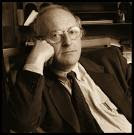 This morning I have been listening to Iqbal Bano's beautiful rendition of Faiz's ghazal "Yeh mausam-e-gul garche" and thinking about poetry as the highest of art forms. The subtlety of thought and the economy of expression required for good poetry militates against a lazy, rambling and unstructured mind. The Nobel laureate poet Joseph Brodksy starts his collection of critical essays "Of Grief and Reason" with a wonderful quote from W.H. Auden: "Blessed be all metrical rules that forbid automatic responses, force us to have second thoughts, free from the fetters of Self."
This morning I have been listening to Iqbal Bano's beautiful rendition of Faiz's ghazal "Yeh mausam-e-gul garche" and thinking about poetry as the highest of art forms. The subtlety of thought and the economy of expression required for good poetry militates against a lazy, rambling and unstructured mind. The Nobel laureate poet Joseph Brodksy starts his collection of critical essays "Of Grief and Reason" with a wonderful quote from W.H. Auden: "Blessed be all metrical rules that forbid automatic responses, force us to have second thoughts, free from the fetters of Self."
With that, here are some verses of Faiz's ghazal mentioned above from "Sham-e-Shehr-e-YaaraN" that precipitated this reverie:
Yeh mausam-e-gul garche tarab khez bohat hai
Sunday, November 11, 2007
Mohsin Hamid on NPR & Solidarity with Justice Bhagwandas
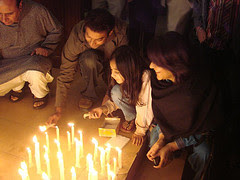 "Citizens of Islamabad gathered outside Civil Junction to celebrate DIWALI in solidarity with the Honourable Justice Rana Bhagwandas, our courageous 'Prisoner of Conscience' who was forced to celebrate this significant event at home. Thank you, honourable Bhagwandas and the 6 other honourable judges for giving 'hope' to our children. We will always be grateful to you and you will live forever in history."
"Citizens of Islamabad gathered outside Civil Junction to celebrate DIWALI in solidarity with the Honourable Justice Rana Bhagwandas, our courageous 'Prisoner of Conscience' who was forced to celebrate this significant event at home. Thank you, honourable Bhagwandas and the 6 other honourable judges for giving 'hope' to our children. We will always be grateful to you and you will live forever in history."
Friday, November 09, 2007
The Struggle for Rights
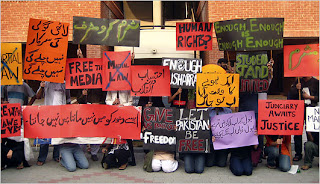 Freedom has its life in the hearts, the actions, the spirit of men and so it must be daily earned and refreshed - else like a flower cut from its life-giving roots, it will wither and die.
Freedom has its life in the hearts, the actions, the spirit of men and so it must be daily earned and refreshed - else like a flower cut from its life-giving roots, it will wither and die.Those who expect to reap the blessings of freedom, must, like men, undergo the fatigue of supporting it.
~Thomas Paine
Photo Credit: Protest at LUMS(from the NY Times)
Thursday, November 08, 2007
Asma Jahangir's Appeal to Support Lawyers and Judges in Pakistan
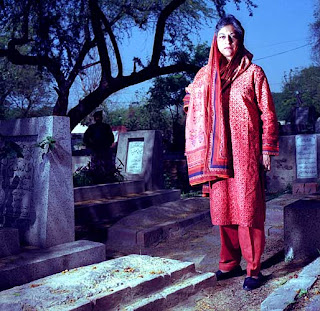 Asma Jahangir has sent out an urgent e-mail appealing to bar associations all over the world to support the imprisoned lawyers and judges of Pakistan. This is indeed a heartbreaking situation that demands that civilized people all over the world join forces to defeat Musharraf's forces of oppression and terror. Please read her appeal and support Pakistani civil society any way you can. She is a true hero and as long as there are courageous and principled people like her in Pakistan I refuse to lose hope.
Asma Jahangir has sent out an urgent e-mail appealing to bar associations all over the world to support the imprisoned lawyers and judges of Pakistan. This is indeed a heartbreaking situation that demands that civilized people all over the world join forces to defeat Musharraf's forces of oppression and terror. Please read her appeal and support Pakistani civil society any way you can. She is a true hero and as long as there are courageous and principled people like her in Pakistan I refuse to lose hope.law@aghs.brain.net.pk
Special Rapporteur of the UN Commission on Human Rights on extrajudicial, summary or arbitrary executions(Since August 1998)
Wednesday, November 07, 2007
The Struggle for a New Pakistan in the Shadow of Tyranny
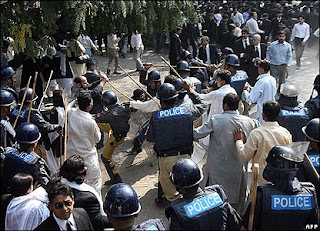 A combination of distractions had kept me away from this blog for a few months despite having queued up a number of things I had been meaning to write about such as a piece on Quarratulain Hyder and one on Pakistani writers in English. Depressed by the shenanigans of BB and the politicians, NRO and the sham Presidential elections I just couldn't muster the enthusiasm to even consider writing about Paksitan but then ----
A combination of distractions had kept me away from this blog for a few months despite having queued up a number of things I had been meaning to write about such as a piece on Quarratulain Hyder and one on Pakistani writers in English. Depressed by the shenanigans of BB and the politicians, NRO and the sham Presidential elections I just couldn't muster the enthusiasm to even consider writing about Paksitan but then ----Friday, August 03, 2007
"Mother of All Deals": A Recipe for Continued Instability
If he is factually correct about the specifics of the "Mother of all deals" (it still seems speculative punditry to me), then his analysis is naive in the extreme. It increasingly seems to me that Sethi has become so caught up in being an influential insider with a privileged view of the daily "jor tor" of power politics that he has lost his analytical moorings.
One key flaw in his reasoning is his completely static analysis of the "deal" in which a few key players (Musharraf, Bhutto, Fazl-ur-Rehman) will redraw the political map amongst themselves and everything else will fall in line. Sethi displays no awareness that the arrangement he outlines would be deeply unstable and will have resolved few of the fundamental contradictions at the heart of Pakistan's current crisis of governance. The deal will not begin to resolve the issues of military-civilian power balance nor the current lopsided dynamic of power between the Presidency and the Parliament. After the elections, the countdown to Musharraf's "uniform doffing date" will start immediately with all the attendant speculation and uncertainties that were experienced when he made this "promise" the last time around. The nation will once again be witness to endless maneuvering and horse trading between Mush and the parliament to demarcate boundaries of power with the military remaining at the center of the controversy. Meanwhile all the problems and complexities of actual governance will remain neglected.
The deal is also likely to alter the political landscape in other unexpected ways: PML-Q and PPP could experience significant dissension from within and PPP will likely lose popular support, particularly in Punjab, for bailing out a weakened Musharraf. The parties cut out of the power equation unceremoniously by PPP (i.e. PML-N, JI, PTI) will continue their campaign against the unpopular uniformed President with the added grievance of the PPP "betrayal". After saving Musharraf again, Fazl-ur-Rehman will revert back to form excoriating the secular Musharraf and his allies to please his Taliban constituency during and after the elections. The end result of this deal will almost certainly be to weaken moderate forces as they will be viewed as having compromised on basic principles for personal gain. The amalgam of anti-Musharraf, anti-PPP right (with PML-N and PTI pushed into this grouping) will gain in stature to the long term detriment of the Pakistani polity.
Reading Sethi you would think that the deal is a panacea for Pakistan's ills. It will do nothing but prolong the agony of the last couple of dysfunctional years. The need is for Musharraf to doff his uniform and hold free and fair elections. After he takes these steps if certain political parties, like PPP, want to elect him a civilian President there will be fewer objections to it. But at least getting Musharraf to abide by some basic rules right away will help begin a rational process by which the balance of institutional powers could be restored back to the original constitutional intentions. This route is also more likely to avoid a dangerous split between PPP and PML-N. To tackle Pakistan's complex domestic and national issues it is imperative that the large mainstream parties develop a working relationship with some basic trust in each other.
It is my hope that Sethi's view is not the prevailing wisdom in Pakistan's elite circles and that the PPP leadership displays greater political foresight. Unfortunately, the recent events and statements emanating from BB do not leave anybody optimistic. Another opportunity to right the ship of state seems likely to be squandered.
Bob Dylan in Concert
 Last weekend, I was thrilled to be a part of a memorable musical experience when I saw Bob Dylan perform live in concert for the first time. Dylan performed in Kelseyville, California about a 150 mile drive from where I live in the San Francisco Bay area. The venue was the charming 5,000-person capacity Konocti Outdoor Amphitheater on the banks of the Clear Lake. It was a beautiful, warm summer evening and the concert was an absolute treat.
Last weekend, I was thrilled to be a part of a memorable musical experience when I saw Bob Dylan perform live in concert for the first time. Dylan performed in Kelseyville, California about a 150 mile drive from where I live in the San Francisco Bay area. The venue was the charming 5,000-person capacity Konocti Outdoor Amphitheater on the banks of the Clear Lake. It was a beautiful, warm summer evening and the concert was an absolute treat.I certainly cannot claim to be one of those lifelong Dylan fans who know the lyrics to every Dylan song and can reliably narrate every twist and turn of his long and remarkable performing career but I have been an admirer of his music and songwriting for a long time. Some of Dylan's songs such as "It's all over now, baby blue" and "Shelter from the storm" make the list of my all time favorites. However, to be fair, my desire to see Dylan in concert was also based, in part, on experiencing first hand a performance of this unique 60's counterculture icon.
Dylan is 66 years old and since 1988 has been on a "Never Ending Tour" performing more than 100 concerts a year. His voice is now more gruff and raspy than in his famous studio recordings but it still retains that quintessential raw quality. The performance was extremely lively and energetic. Dylan and his Band have refused to turn these live concerts into nostalgia acts so even the classic oldies are typically performed in newer arrangements. For those like me who don't follow the band around, it would have been nice to hear some of the familiar arrangements for songs like "Blowin' in the wind" but overall it was still an exhilarating experience.
Here's the set that Dylan and the Band played that evening:
1. Leopard-Skin Pill-Box Hat (Bob on electric guitar)
2. It Ain't Me, Babe (Bob on electric guitar)
3. I'll Be Your Baby Tonight (Bob on electric guitar)
4. It's Alright, Ma (I'm Only Bleeding)(Bob on electric guitar)
5. Workingman's Blues #2 (Bob on keyboard)
6. Rollin' And Tumblin' (Bob on keyboard)
7. Boots Of Spanish Leather (Bob on keyboard and harp)
8. Lonesome Day Blues (Bob on keyboard)
9. Desolation Row (Bob on keyboard and harp)
10. Highway 61 Revisited (Bob on keyboard)
11. Spirit On The Water (Bob on keyboard and harp)
12. Stuck Inside Of Mobile With The Memphis Blues Again(Bob on keyboard and harp)
13. Ain't Talkin' (Bob on keyboard)
14. Summer Days (Bob on keyboard)
15. Blowin' In The Wind (Bob on keyboard)
(encore)
16. Thunder On The Mountain (Bob on keyboard)
17. All Along The Watchtower (Bob on keyboard)
(With thanks to Bill Pagel's Bob Dylan tour webpage for details on the set)
Here's one of my Dylan all-time favorites:
Monday, July 23, 2007
Dalrymple & Hamid - Understanding the Rage
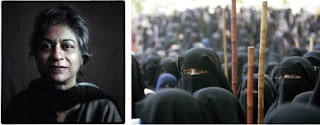 As of late, Pakistan has been a hot topic in the Western press. Most of the coverage is the usual unenlightening blather about nukes and extremism but there have been a few good, thoughful pieces. Of course, given the tumultuous nature of current Pakistani politics, events on the ground soon overtake even the most up to date writings on the country.
As of late, Pakistan has been a hot topic in the Western press. Most of the coverage is the usual unenlightening blather about nukes and extremism but there have been a few good, thoughful pieces. Of course, given the tumultuous nature of current Pakistani politics, events on the ground soon overtake even the most up to date writings on the country.The Triumph of Justice but What's Next
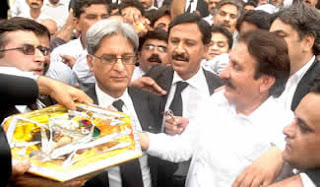 July 20th, 2007 will be long remembered as a historic day in Pakistan when the honorable judges of the Supreme Court, led by Justice Ramday, reinstated the suspended Chief Justice and struck a vital blow for an independent Judiciary in the country. This unequivocal reversal of Musharraf's political folly has breathed life into Pakistan's moribund political landscape.
July 20th, 2007 will be long remembered as a historic day in Pakistan when the honorable judges of the Supreme Court, led by Justice Ramday, reinstated the suspended Chief Justice and struck a vital blow for an independent Judiciary in the country. This unequivocal reversal of Musharraf's political folly has breathed life into Pakistan's moribund political landscape.Sunday, June 10, 2007
"Pakistan's Dictator" - New York Times Gets it Right
I would encourage all those who are able to write to the New York Times to write and express approval of the newspaper's stance supporting the restoration of a rule of law-based democratic government in Pakistan. Instructions of where and how to send the letter here.
Saturday, June 09, 2007
The Evolution of Larry Summers
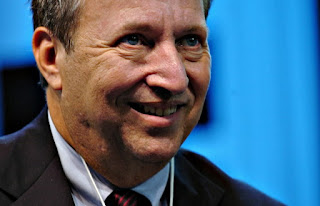 The New York Times Sunday Magazine has a remarkably interesting profile of Larry Summers discussing the evolution of his thinking on economic matters but also touching on the development of his personality since his stint under Robert Rubin at the Treasury. Summers is an impressive intellect who, at 52 years of age, has accomplished more in three different careers than many talented people do in a lifetime.
The New York Times Sunday Magazine has a remarkably interesting profile of Larry Summers discussing the evolution of his thinking on economic matters but also touching on the development of his personality since his stint under Robert Rubin at the Treasury. Summers is an impressive intellect who, at 52 years of age, has accomplished more in three different careers than many talented people do in a lifetime.Monday, June 04, 2007
Government of the Generals, by the Generals, for the Generals
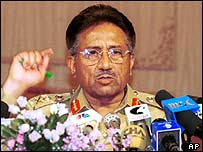 Deciphering the underlying reality from official proclamations is always a risky business, but if we take at face value the statement issued by the Corp Commanders and Staff Officers of the Pakistan Army after discussions with President/COAS Musharraf, the signs for the republic are indeed ominous. The statement loudly proclaims fealty to Musharraf, applauds his great dual role accomplishments, threatens the media and civil society and demands respect on the point of a gun for an institution thoroughly compromised by its taste for economic and political power. Here is a most shameless display by the army's leadership of besmirching its own honour and a violation of their oath of allegiance to the constitution and the country. No amount of browbeating of the public will force it to respect an individual or an institution. As the American civil rights leader Eldridge Cleaver aptly said: "Respect commands itself and it can neither be given nor withheld when it is due."
Deciphering the underlying reality from official proclamations is always a risky business, but if we take at face value the statement issued by the Corp Commanders and Staff Officers of the Pakistan Army after discussions with President/COAS Musharraf, the signs for the republic are indeed ominous. The statement loudly proclaims fealty to Musharraf, applauds his great dual role accomplishments, threatens the media and civil society and demands respect on the point of a gun for an institution thoroughly compromised by its taste for economic and political power. Here is a most shameless display by the army's leadership of besmirching its own honour and a violation of their oath of allegiance to the constitution and the country. No amount of browbeating of the public will force it to respect an individual or an institution. As the American civil rights leader Eldridge Cleaver aptly said: "Respect commands itself and it can neither be given nor withheld when it is due."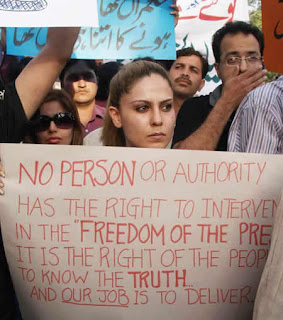 The army hierarchy clearly seems irritated by the increasingly direct criticism of the military's central role in the political and economic spheres in Pakistan. But this is a debate that is long overdue. The military's chokehold on the affairs of state have resulted in weak political institutions, enriched the officer corps at the expense of the nation, distorted national priorities and shifted the military's focus away from professional matters. The presence of all intelligence heads (MI, ISI and IB) in the meeting to persuade the CJP to resign was an egregious illustration of how far the military has moved away from its primary responsibility of national security and instead become the full-time guardian of its corporate and political interests. Civilian control of military affairs is the established norm in every civilized democratic government (including our neighbor) and, as distant as that may seem today, it is the desired end state in Pakistan as well. The code words for suppressing this legitimate debate on the military's role in Pakistani society are "respect" and "politicization". It is laughable that a COAS/President instructs the nation not to politicize the army when he controls all the levers of political power, uses his political and ethnic surrogates to create mayhem in Karachi, holds meetings at the Presidency and Army House with his political cronies, pressurises his presumed judicial opponent in uniform surrounded by senior military personnel and then huddles with his military leadership to issue a threatening statement to the country to preserve self-rule. Mr. President, it is hard to imagine how the army could be any more politicized!!
The army hierarchy clearly seems irritated by the increasingly direct criticism of the military's central role in the political and economic spheres in Pakistan. But this is a debate that is long overdue. The military's chokehold on the affairs of state have resulted in weak political institutions, enriched the officer corps at the expense of the nation, distorted national priorities and shifted the military's focus away from professional matters. The presence of all intelligence heads (MI, ISI and IB) in the meeting to persuade the CJP to resign was an egregious illustration of how far the military has moved away from its primary responsibility of national security and instead become the full-time guardian of its corporate and political interests. Civilian control of military affairs is the established norm in every civilized democratic government (including our neighbor) and, as distant as that may seem today, it is the desired end state in Pakistan as well. The code words for suppressing this legitimate debate on the military's role in Pakistani society are "respect" and "politicization". It is laughable that a COAS/President instructs the nation not to politicize the army when he controls all the levers of political power, uses his political and ethnic surrogates to create mayhem in Karachi, holds meetings at the Presidency and Army House with his political cronies, pressurises his presumed judicial opponent in uniform surrounded by senior military personnel and then huddles with his military leadership to issue a threatening statement to the country to preserve self-rule. Mr. President, it is hard to imagine how the army could be any more politicized!!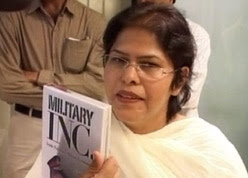 The CJP's forcible removal was just a catalyst for this current conflagration but the truth is that the underlying malignancy of this regime was eventually bound to be exposed. Musharraf's liberal supporters have often forgotten this in the past that in a dictatorial polity without democratic representation and legitimacy, it does not matter much whether the government happens to promote liberal or fundamentalist behavior. The ultimate yardstick is always self-preservation and the perpetuation of one man rule. It has taken this crisis to expose the regime's fragility and to strip it of its faux-gentle facade. How often did Musharraf talk about the "true democracy" he was establishing and touted the freedom of the press that "he had granted" so magnanimously! Of course, it turns out that the media is free as long as it does not tell unpleasant truths that threaten his hold on power. At the first signs of trouble we have Geo and AajTV off the air, promulgation of the media-gagging PEMRA 2007 ordinance, hounding of the courageous scholar and author of Military Inc. Dr. Ayesha Siddiqa and explicit threats to respected journalists all over the country.
The CJP's forcible removal was just a catalyst for this current conflagration but the truth is that the underlying malignancy of this regime was eventually bound to be exposed. Musharraf's liberal supporters have often forgotten this in the past that in a dictatorial polity without democratic representation and legitimacy, it does not matter much whether the government happens to promote liberal or fundamentalist behavior. The ultimate yardstick is always self-preservation and the perpetuation of one man rule. It has taken this crisis to expose the regime's fragility and to strip it of its faux-gentle facade. How often did Musharraf talk about the "true democracy" he was establishing and touted the freedom of the press that "he had granted" so magnanimously! Of course, it turns out that the media is free as long as it does not tell unpleasant truths that threaten his hold on power. At the first signs of trouble we have Geo and AajTV off the air, promulgation of the media-gagging PEMRA 2007 ordinance, hounding of the courageous scholar and author of Military Inc. Dr. Ayesha Siddiqa and explicit threats to respected journalists all over the country.Musharraf's end will be similar to all the other khaki saviors in Pakistan's sordid history ("they leave themselves no other options") but how much more damage he does to the country before he is consigned to the dustbin of history is still an open question. If the escalations of the past few days are any indication, Musharraf will not go without causing a lot more pain to the fragile Pakistani state.
Wednesday, May 23, 2007
United States Belongs on the Side of Democracy
The United States needs to unambiguously weigh in on the side of constitutional democratic governance and the people of Pakistan. It is the right position on moral and pragmatic grounds. Only consistent and clear support by the US government for civil society forces that advocate and struggle for a rule of law, democratic governance, free media and human rights will eventually create Muslim societies that are not a threat to themselves and the rest of the world. American governments often speak of these principles but rarely stand behind them when it matters most. Pakistan's courageous civil society (which sadly does not even look to the US for inspiration any more) is leading an inspiring struggle of the kind that American officials pray for in Iran, but in Pakistan it only results in banal State Department statements of support for our erstwhile uniformed ally. Pakistanis and the Muslim world will believe in America's rhetoric only if it consistently backs its own principles and does not sacrifice them at the altar of short term expediency. Only America has the clout to make a real difference in promoting freedom and stability in Pakistan and America needs to answer the call. We need not fear a democratic Pakistan. Only a country on a more solid democratic footing with a representative government can be a stable and reliable ally.
Here are the powerful words that end the NY Times editorial:
"A succession of uniformed dictators has misruled Pakistan for more than half of its 60-year history. All have advertised themselves as great friends of Washington, but all have fanned extremism while discrediting America’s reputation among ordinary Pakistanis. There is no security with General Musharraf. The United States belongs on the side of Pakistani democracy".
Monday, May 14, 2007
Tyranny Descends on Pakistan
I will not criticize the media for succumbing to this extreme coercion while working in an environment of constant threats and extreme insecurity as they are and have been doing a courageous job of standing up to unjust authority. However, I would implore the journalists and media owners to resist, to the best of their abilities, this new phase of darkness being imposed by a government which cares for nothing but the perpetuation of its illegal and authoritarian rule. This valiant effort of the people to reclaim political space from a usurping military should not go to waste. The end result of this struggle needs to be an independent judiciary, free media, a strengthened rule of law and a return to civilian rule.
Here is to the hope that the people of Pakistan will soon escape the yoke of this latest self-styled uniformed savior and will overtime (with painstaking effort) build a democratic polity that can produce civilian leaders worthy of governing this country and able to build a decent state for its people.
Saturday, May 12, 2007
A Dark Day in Pakistan's History - Karachi Burning
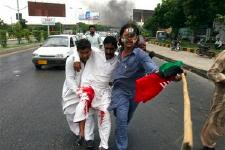 The details emerging out of Pakistan are still somewhat sketchy but some facts are clear; more than 30 people are dead and over 115 injured. The CJ was unable to address the Sindh Bar Association and was forced to go back to Islamabad and the private television station Aaj TV, which has been in the forefront of covering pro-judiciary and anti-Musharraf protests, was attacked by armed gunmen. This is indeed another dark day in the checkered political history of Pakistan. It is now well past time for the shameful Musharraf regime to go. This illegal government has now lost the last shreds of moral authority required to govern. I salute the men and women of the civil society of Pakistan and the courageous independent media who are leading this struggle for the supremacy of the law and freedom of expression at grave risk to their life and limb.
The details emerging out of Pakistan are still somewhat sketchy but some facts are clear; more than 30 people are dead and over 115 injured. The CJ was unable to address the Sindh Bar Association and was forced to go back to Islamabad and the private television station Aaj TV, which has been in the forefront of covering pro-judiciary and anti-Musharraf protests, was attacked by armed gunmen. This is indeed another dark day in the checkered political history of Pakistan. It is now well past time for the shameful Musharraf regime to go. This illegal government has now lost the last shreds of moral authority required to govern. I salute the men and women of the civil society of Pakistan and the courageous independent media who are leading this struggle for the supremacy of the law and freedom of expression at grave risk to their life and limb.As tragic and sad as today's events in Karachi are, this political moment is of historic import for the people of Pakistan and even on this day of darkness I see some hope for a better future. Since the sacking of the CJP on March 9th, the heroic struggle of the lawyers has germinated greater democratic desire and decisively strengthened Pakistan's civil society and its beleagured independent media. In the face of relentless governmental coercion there have been heartwarming displays of peaceful resistance, none more evident than in the historic journey of Justice Chaudhry through the heart of Punjab. Those in Pakistan and abroad who desire an eventual constitutional democratic polity rooted in a rule of law have to be encouraged by these developments. The conclusion of this episode, however, remains highly uncertain because no political sagacity can be expected from those who have brought us to this pass.
This grassroots peoples' movement has also forced the politicians of all hues to make a choice; they either stand on the side of the rule of law or for the perpetuation of a dangerously unstable, one-man military banana republic. Mainstream politicians (despite all their historical shortcomings) clearly seem to grasp the national mood and the King's men who are standing up for the present dispensation to save their personal fiefdoms will hopefully pay a steep price whenever they face the electorate in a fair election. MQM more clearly exposed itself today than it ever has in its sordid history (thanks to private TV channels). The party that started with great hopes, rooted in the educated middle classes has over the years just become a collection of vicious thugs. It is wielding its fascistic tactics on behalf of people who seem to believe they have a divine right to perpetual power and who originally nurtured this party as a counterweight to PPP. MQM has shown itself the mirror image of the worst of MMA; both groups want people to acquiesce to their ideologies by force. Neither believes in nor has any fundamental respect for a constitutional rule of law.
Pakistan stands at a critical juncture as it has so many times in its unfortunate 60 year independent history. I would urge all Pakistanis and their well wishers to lend thier support to the struggle of Pakistan's revitalized civil society. Let's hope that the forces of peaceful democratic activism led by the country's courageous lawyers ultimately emerge victorious and we can close this latest chapter of the military's recurring era of authoritarian and unconstitutional misrule without further human suffering.
Monday, March 12, 2007
Protests in Pakistan
 I felt a sense of pride in the strong response today from Pakistan's civil society to Musharraf's outrageous sacking of the Supreme Court Chief Justice. Led by the country's lawyers, there was a heartening willingness to stand up for the rule of law and against dictatorial fiat. This attack on judicial independence is a naked move to neutralize any smidgen of opposition to one man rule in the country. Musharraf wants the entire nation to acquiesce to his being a uniformed President for life and the final arbiter of the "national interest" even as state institutions (other than the military) wither away.
I felt a sense of pride in the strong response today from Pakistan's civil society to Musharraf's outrageous sacking of the Supreme Court Chief Justice. Led by the country's lawyers, there was a heartening willingness to stand up for the rule of law and against dictatorial fiat. This attack on judicial independence is a naked move to neutralize any smidgen of opposition to one man rule in the country. Musharraf wants the entire nation to acquiesce to his being a uniformed President for life and the final arbiter of the "national interest" even as state institutions (other than the military) wither away.The establishment of democratic, constitutional governance in Pakistan will happen only when people stand up and fight for their own rights. No individual, no foreign power will give people their rights on a platter. It was deeply disappointing to me, though not surprising, that there has been virtually no coverage in the US media of this constitutional crisis in a country which is supposedly the "closest ally" in the war on terrorism. There have been countless articles written in the US on the "democratic deficit" in the Muslim world but when mainstream, moderate elements in these countries protest the dictatorships imposed on them by tacit or explicit American support, not a peep is heard amongst the Western crusaders of Muslim reform. One can imagine the coverage today's protests would have received if they had happened in Tehran against the Iranian theocracy. Criticism of "our sons of bitches" (Musharraf, Hosni Mubarak, the Saudis) is somehow always more muted than the legitimate scorn poured on the likes of Chavez, Mugabe and Ahmedinejad. On international affairs, the American "free media" seems mostly to take its cue from the government.
BBC, at least, has to be commended for giving the story its due. It has an interesting analysis of the entire episode. There are also photographs of the protests here.
Saturday, March 10, 2007
Another Shameful Episode
Anybody with a rudimentary knowledge of Pakistan's sordid khaki-dominated political history can be forgiven for not taking the official reasons seriously. Given that Musharraf has not shown the slightest regard in the past about the destruction of politial institutions or the probity of our judiciary there is not an iota of reason to believe that this was motivated by anything other than power consolidation. This is just a step in the preparation for rigged elections later in the year to keep Musharraf in power and uniform in perpetuity. In retrospect it is clear that Naeem Bukhari's letter widely circulated on the internet was a charade likely orchestarted by the agencies in preparation for this pre-meditated move. Whatever Justice Chaudhry's personal shortcomings it is indeed a fact that he has presided over several decisions that have embarassed the government including the high profile Steel Mills case. His probing in the disappearance of hundreds of Pakistanis into the lawless, Kafkaesque world of Pakistani military intelligence also likely did not endear him to Musharraf and his cronies (amongst them that crying shame of an enabler Prime Minister, Shaukat 'shortcut' Aziz). Going into a fraught political season Musharraf cannot take any chances. That this was orchestrated at a time when the next in seniority Justice Bhagwandas was out of the country provides more evidence of the government's real intentions.
I find Pakistan's current political scene, never encouraging, extremely depressing of late. Musharraf and the army's perpetual chokehold on the people, with intelligence agencies as instruments, has sapped the country of its vitality. Mainstream political parties are paralyzed and in complete disarray. The mullahs are more regressive than ever. Law and order is at an all time low. Pakistanis are likely to emerge from the Musharraf nightmare as a country institutionally more decimated than at any other time in its history. The people of this benighted land seem destined forever to be at the mercy of one tinpot uniformed dictator after another.
The best we can do is to continue to raise our voices for the rule of law and in opposition to constant governmental violations of fundamental rights and to the systematic taking over of the institutions of state by an unaccountable and parasitic elite military class (there are of course honorable exceptions in the military but too few sadly). I am reminded of Dylan Thomas's famous poem, pessimistic as it no doubt is:
Do not go gentle into that good night,
Old age should burn and rave at close of day;
Rage, rage against the dying of the light.
Though wise men at their end know dark is right,
Because their words had forked no lightning they
Do not go gentle into that good night.
Wednesday, February 14, 2007
W.H. Auden: "O Tell Me The Truth About Love"
O Tell Me The Truth About Love
Some say that love's a little boy,
And some say it's a bird,
Some say it makes the world go round,
And some say that's absurd,
And when I asked the man next-door,
Who looked as if he knew,
His wife got very cross indeed,
And said it wouldn't do.
Does it look like a pair of pajamas,
Or the ham in a temperance hotel?
Does it's odour remind one of llamas,
Or has it a comforting smell?
Is it prickly to touch as a hedge is,
Or soft as eiderdown fluff?
Is it sharp or quite smooth at the edges?
O tell me the truth about love.
Our history books refer to it
In cryptic little notes,
It's quite a common topic on
The Transatlantic boats;
I've found the subject mentioned in
Accounts of suicides,
And even seen it scribbled on
The backs of railway-guides.
Does it howl like a hungry Alsatian,
Or boom like a military band?
Could one give a first-rate imitation
On a saw or a Steinway Grand?
Is its singing at parties a riot?
Does it only like Classical stuff?
Will it stop when one wants to be quiet?
O tell me the truth about love.
I looked inside the summer-house;
it wasn't ever there:
I tried the Thames at Maidenhead,
And Brighton's bracing air.
I don't know what the blackbird sang,
Or what the tulip said;
But it wasn't in the chicken-run,
Or underneath the bed.
Can it pull extraordinary faces?
Is it usually sick on a swing?
Does it spend all it's time at the races,
Or fiddling with pieces of string?
Has it views of it's own about money?
Does it think Patriotism enough?
Are its stories vulgar but funny?
O tell me the truth about love.
When it comes, will it come without warning
Just as I'm picking my nose?
Will it knock on my door in the morning,
Or tread in the bus on my shoes?
Will it come like a change in the weather?
Will its greeting be courteous or rough?
Will it alter my life altogether?
O tell me the truth about love.
Saturday, February 03, 2007
The Inhuman Enemy
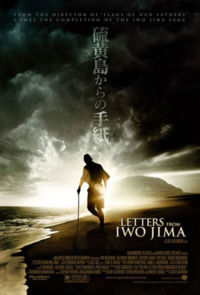 Yesterday I read Ian Buruma's excellent review of Clint Eastwood's new film "Letters from Iwo Jima" in the New York Review of Books. This film, in the Japanese language, has been widely praised by critics, winning the Golden Globe for "Best Foreign Language Film". The passage below in Buruma's review really caught my eye:
Yesterday I read Ian Buruma's excellent review of Clint Eastwood's new film "Letters from Iwo Jima" in the New York Review of Books. This film, in the Japanese language, has been widely praised by critics, winning the Golden Globe for "Best Foreign Language Film". The passage below in Buruma's review really caught my eye:"Most war movies have been about heroes, our heroes, and individual differences among the enemies were irrelevant, since their villainy could be taken for granted. In fact, showing individual character, or indeed any recognizable human qualities, would be a hindrance, since it would inject the murderousness of our heroes with a moral ambiguity that we would not wish to see. The whole point of feel-good propaganda is that the enemy has no personality; he is monolithic and thus inhuman."
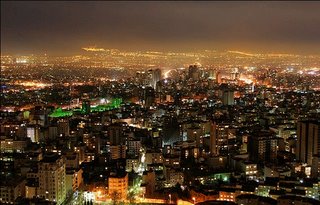 This reminded me of a recent e-mail I had received with a link to an old song by Cat Stevens (Yusuf Islam nowadays) called "Peacetrain". The song is in the background as images of modern day Tehran flash on the screen. These images of everyday life paint a portrait of a people not unlike 'us' as opposed to pictures of an implacably ugly and hostile enemy conjured up by political propaganda. How many people visualize Tehran and its people in this way when they speak of bombings and military action? The message is powerful and surprisingly effective in its simplicity because it subverts the very essence of propaganda, the inhumanity of the 'other'.
This reminded me of a recent e-mail I had received with a link to an old song by Cat Stevens (Yusuf Islam nowadays) called "Peacetrain". The song is in the background as images of modern day Tehran flash on the screen. These images of everyday life paint a portrait of a people not unlike 'us' as opposed to pictures of an implacably ugly and hostile enemy conjured up by political propaganda. How many people visualize Tehran and its people in this way when they speak of bombings and military action? The message is powerful and surprisingly effective in its simplicity because it subverts the very essence of propaganda, the inhumanity of the 'other'.
Monday, January 22, 2007
Lahore Revisited
 I just returned from a brief trip to Lahore and despite having only a few days there I was able to spend almost a full day inside the enchanting walled city area. I started out at Mori Gate and walked all the way across to Roshnai Gate at the end of Shahi Mohallah Road just past landmarks such as the Mazaar of Hazrat Naugaza Pir and the famous "Phajjay ke Pai" restaurant. Walking through the Roshnai gate I entered the Hazuri Bagh area and past the garden to the entrance of Gurdawara Dera Sahib / Ranjit Singh Smadhi.
I just returned from a brief trip to Lahore and despite having only a few days there I was able to spend almost a full day inside the enchanting walled city area. I started out at Mori Gate and walked all the way across to Roshnai Gate at the end of Shahi Mohallah Road just past landmarks such as the Mazaar of Hazrat Naugaza Pir and the famous "Phajjay ke Pai" restaurant. Walking through the Roshnai gate I entered the Hazuri Bagh area and past the garden to the entrance of Gurdawara Dera Sahib / Ranjit Singh Smadhi.The visit to the Gurdawara turned out to be the highlight of my visit. For a long time I have wanted to see this classic Sikh structure but, for reasons unknown, Muslims are not allowed to visit this sacred monument. On a whim I asked a turbaned Sardar standing outside if I could see the Gurdawara. He thought it might be possible and agreed to ask a caretaker. He went inside the complex and returned a few minutes later with an elderly gentleman who after asking me a few questions invited me to come inside. Mr. Harpal Singh was exceptionally kind and gave me a guided tour of the premises, pointing out historic facts about the building. The thing I did not know was that this monument also contains the "Shaheedi Asthan" (the site of martyrdom) of Guru Arjun Dev (the fifth Guru of the Sikhs). Harpal Ji took me to the sacred area where the Guru Granth Sahib is kept and explained the concept of the "Akhand Paath" (the recitation of the entire Granth Sahib in a single setting which can take more than two days). There is an Akhand Paath in the Gurdawara on June 12th, the day of Guru Arjun Dev's martyrdom. Guru Arjun Dev died during the reign of Emperor Jahangir. During his confinement in a prison in the Lahore Fort, the Guru is believed to have vanished into the water miraculously and attained martyrdom after his captors were persuaded to allow him to go bathe in the River Ravi.
After thanking Harpal Ji I walked back into the walled city via Roshnai Gate and winded my way through the streets and alleys all the way to Masjid Wazir Khan inside Delhi Gate passing innumerable shops, bazaars, historic landmarks, shrines, mosques and imambargahs in Mori Gate, Lohari Gate, Shah Alam Bazaar, Mochi Gate and Akbari Mandi. Masjid Wazir Khan is one of the most beautiful and famous mosques in Lahore. It is an oasis of peace set in the midst of crowded bazaars pulsating with constant, loud and hectic commercial activity. In the courtyard of the mosque is the mazaar of the 13th century sufi saint known as Sabz Pir. I sat in the mosque courtyard for a while looking at the delicate decorations on the walls, the surrounding brick buildings overlooking this serene 17th century structure and flocks of pigeons fluttering on the mosque's domes and minarets.
On my way to the walled city I made the essential stop at Kim's; a tiny but wonderful bookstore which is part of the Lahore Museum complex and sits just across from Kim's Gun and Punjab University's Old Campus and adjoins the National College of Arts. I always discover books there that I never find anywhere else in the city. I bought Majid Sheikh's new book called "Lahore: Tales without End" and Som Anand's "Lahore: Portrait of a Lost City". Both books, in very different ways, are treasure troves of vignettes about Lahore and its people. Among dozens of fascinating Lahori tales recounted by Majid Sheikh is the story of the Renault Benz gifted by Adolf Hitler to Allama Mashriqi (founder of the Khaksar Tehreek). This car in a rusted, dilapidated state is still parked in Icchra in the courtyard of Allama Mashriqi's house. Allama's descendants still live in that house.